Main

so that you would love me.” EM’s words the other day got me thinking about the human condition.
Hannah Arendt, I’m certainly not. And I’m not equating my daughter’s desire for attention and affection with Hannah’s vision of the modern age .
But her drawing and comment did make me wonder about our the nature of our relationships. And our basic, primal need for love, interaction and approval. At four, EM’s world is focused around our family. At 14, it’s safe to surmise, she’ll be focused on her peers. And at 60 … well, who knows.
The simple equation of a) doing something for b) receiving a (positive) (re)action will be enacted time and again throughout her life - in all realms: public, private and social.
Shampoo, rinse, repeat.

It’s an addiction like none other. It’s true, I’m a social media convert, spending most of my time online on Twitter and Facebook. It started as research for my job as a communications professional studying and figuring out how web 2.0 platforms work. Along the way I realized just how much I enjoyed the conversation. So, you have an open invitation to follow me on Twitter.
I started this blog with the strong desire to reach out to the writing community and share my creativity with a larger audience. Through my blogging I developed strong friendships with writers and those connections have enriched my life to no end. I remain committed to chicken-scratch, to blogging and to my writing. What makes a blog come alive is not only the content but being authentic. And, I’ve always been me. I’m now doing research on how to embrace and link comments so that they become part of a larger conversation. So here’s another invitation - do you, my readers, have any ideas, suggestions on how to make that happen on here? How do we make chicken-scratch more interactive without breaking the bank?

It’s the last week of January and I’ve been terribly remiss in posting. 2009 has ushered in many changes. A new work assignment. Home renovations (well, the entire interior of our home is being repainted, polished and redone; we’ve had a crew here for three weeks.) Our social and family commitments have kept us pretty busy during our limited downtime. These are legitimate reasons about what has kept me away from chicken-scratch.
But to me, they sound like excuses. And so, I’ll share a secret with you: I started the blog to keep my writing alive, to find an audience for my unpublished works. Along the way, I met some really cool, intelligent women writers BUT I didn’t really write anything new. I posted lots of pretty pictures and shared some prose - but didn’t really share anything too risky. I wanted my prose to be polished and pure - free from any critique.
It’s because words carry so much weight. I expect the written word to be perfect, profound, whole. And so, I wrote myself into a box. I wanted a friendly readership, an adoring readership to nurse my ego and affirm that my writing, that I, have talent.
- No need to write about sex. Too dirty, too earthy.
- No need to write about relationships. Too real and would leave me expostulating. Or worse, gasping for air.
- No need to write about death. OK - so I did post about my father’s passing and my mother’s passing - but not the grittiness of their deaths. The death of one’s parents make you do crazy things. And not once have I talked about the crazy.
- No need to write about my life. Other than in the most general of terms, because the blogosphere is full of stalkers. And yet, I belong to Facebook and post 140 character updates on Twitter.
And so I collected and posted quotes, photos and articles. And wrote the pithiest of posts.
I turned 41 in October. Maybe this marks my middle-age crisis? Perhaps. What I do know that in order for me to reconnect with this blog, chicken scratch is going to get a whole lot louder, messier and less constrained.
My first drafts and postings may not be polished but they’ll certainly be authentic. My writing may be erratic - and you may see many iterations of the same piece - but at least you’ll get to hear my voice and see how my art progresses.
What good is this blog, if it’s just pretty to look at?

A must read for today: Lisa Levy’s article in the Believer about the life of Elizabeth Hardwick, spouse of Robert Lowell.
Say it’s 1958, you are the wife of a famous poet, and it is your turn to have the Partisan Review gang over for drinks and barbed conversation. Maybe the line from Delmore Schwartz’s poem (“All poets’ wives have rotten lives”) runs through your head as you finish the grunt work of the hostess: emptying ashtrays, dumping half-eaten food into the trash, piling up as many glasses as you can carry to the sink. If you are Elizabeth Hardwick, your husband, Robert Lowell, is most likely passed out drunk or off having an affair-slash-breakdown with another woman. If the situation is the latter, he has renounced you and your daughter, Harriet, for a fascinating creature he suddenly cannot imagine living without, or he’s in an institution of some sort to treat the manic depression that inspires these cyclical acts of renunciation and affirmation. Lowell or no Lowell, there is much to do before you sleep: sweeping the floors, rubbing rings off places where coasters should have been, making a cursory pass over the upholstery, opening the windows to air out the smoke of a hundred pensive and hostile cigarettes. Thus the rhyming line of Schwartz’s poem: “Their husbands look at them like knives.”

Wonderful essay/book-review by Jessa Crispin, found at The Smart Set
It starts when you’re in the first grade. All of a sudden, reading is no longer this exciting thing you just figured out how to do, it has become “good for you.” You’re given free books through a program that says Reading Is Fun-damental, way before any of your teachers will tell you what “fundamental” means. Soon after you’re bribed with a free pizza from Pizza Hut if you can finish five whole books. The message is clear: reading is not something you’re supposed to enjoy, it’s something that will make you a better person.
It continues on into adulthood. We’re given continuous updates on the state of reading in our country as if it were the unemployment rate. Orlando Bloom shows up on posters in libraries, holding a book that you’re slightly surprised to see is right side up. “Read!” he tells us. Read, and you can be as effeminate as he is. If you’re the type of person who enjoys reading — and not just enjoys it, but takes four books on a five-hour flight just in case you finish one and then your back up book isn’t as compelling as you thought it would be and the thought of not having reading material fills you with dread — all of this can be confusing. I would get a lot more reading done if you would stop yelling in my ear about how important reading is, thank you very much.
For all this talk about how reading is good for you, is it really? Can reading actually change you? Maryanne Wolf says yes, starting with when you first learn to read. In Proust and the Squid: The Story and Science of the Reading Brain, she explains how the human brain did not evolve to develop a written language. Instead, the culture evolved to develop one, and the brain had to adapt certain areas previously used for vision, object recognition, and abstract thought. Different languages use different parts of the brain, depending on whether those languages are written in alphabet or logosyllabic form (such as Chinese).
“There are no genes specific only to reading… Unlike its component parts such as vision and speech, which are genetically organized, reading has no direct genetic program passing it on to future generations.” Every child has to rewire her little brain to figure out what Dick and Jane are up to this week. If they don’t learn to read and spend their lives illiterate, they will literally think differently than literate people do.
The more you read and the better you become at reading comprehension, the more of your brain becomes engaged in the act. Wolf calls this the “expert reading” level. When you read a text, your brain brings forth all related experiences from your life and from your reading history. As an expert reader, a more significant portion of your brain starts integrating that material into your thought processes.

With George Orwell, the patron saint of straight-talking as his guide, David Runciman asks when openness becomes just another form of hypocrisy - Guardian, May 17, 2008
Modern democratic politics sometimes seems to have been reduced to a game of hunt the hypocrite. Politicians who do not practise what they preach are an affront to democratic sensibilities, because they seem to be setting themselves apart from the rest of us, obeying their own private rules. The same goes for politicians who do not tell us what they really believe (which is the classical definition of a hypocrite - someone who “masks” the real person underneath). We want our politicians to be sincere, so that we can know they are not hiding anything from us. So all politicians are ceaselessly probed for the little inconsistencies, double standards, concealments and obfuscations that indicate a hypocrite, by opponents who know what damage that label can do. Almost all negative political advertising is essentially an attempt to show that a rival candidate for office is not as good as he or she pretends to be. And that’s why negative advertising works.
This obsession with sincerity, and loathing of bogus sentiment, has benefited some politicians and damaged others. George W Bush, Tony Blair, John McCain and Barack Obama have all taken advantage of the premium we place on politicians who seem to be comfortable in their own skin, and with their own values; Al Gore, John Kerry, Gordon Brown and Hillary Clinton have all suffered from appearing to hold something back, so that we can never be sure who it is we are dealing with. Brown in particular is paying the price for his inability to come to terms with the new confessional politics. People want to know who he really is, but if what he is really is a cautious and reserved politician who plays the percentages, then the public don’t want to know. So he is forced to tour the daytime-TV sofas trying to show his human side, and ends up revealing only how uncomfortable he is with the politics of self-revelation. His caution and his constant calculation make him look like a man in a mask - the classic hypocrite with something to hide.
But there aren’t really any winners here. The sincere politicians soon find that they too look like people with something to hide, since no one can withstand the scrutiny of the 24-hour news cycle. They also discover that no one can survive without chipping away at the sincerity of their opponents. McCain and Obama want to offer a truth-telling politics that stands above partisan bickering, but they also have to make sure that no one is fooled by the fake versions on offer elsewhere. So the straight-talking politicians, as they allow their proxies to rubbish their rivals, end up looking like hypocrites too.

Body Service ~ By Paula Marantz Cohen
I knew something was in the air when the local hair salon started calling itself a day spa. Now all the blue-haired old ladies in town are going to be able to get a Brazilian wax.
When I was growing up, my mother used to go twice a month to the beauty parlor. That was what it was called then — not the hair stylist or even the hair salon, all latter-day terms. She would have her hair cut, colored, or coiffed, and sometimes she would get a manicure. But hair and nails were the extent of it. The body that lay in between was off limits. Caring for that — whatever it might entail — happened in the privacy of the home.
Then, in the 1980s and ’90s, that once-private expanse of the body opened itself to professionals. An array of services sprouted to this end: facials not just for the face, but for the hands, the neck, and the back (yes, there are “back facials”); massages and corollary treatments with stones, mud, and exotic substances; and waxing for every nook and cranny you can imagine — and some you can’t unless you have a very rich imagination.
When I initially began to think about this trend, it seemed to reflect an increased comfort with the body. After all, to let professionals touch you in the way required for a Brazilian wax is not to be a prude. It also seemed to me that bodies without clothing were everywhere. Not just on TV and the Internet, but in the world at large. My female students, for example, displayed an astonishing amount of décolletage, as did the 70-year-old ladies I bumped into in the supermarket. This suggested an exceptional level of comfort with this portion of the anatomy among a very wide age range.
But a friend pointed out that the exposed body nowadays is a far cry from the exposed body of the 1960s. That was the era of hairy underarms and legs, frizzy unkempt hair, and bra-less breasts that sagged under macramé T-shirts. Compare this to the perfect orbs that protrude like hothouse melons from the tank tops of 70-year-olds. “Let it all hang out” has been replaced by “let it all be nicely exhibited.” Walt Whitman (and his hippie successors) sang the “body electric;” we sing the “body electrolysis” — also, siliconed and liposuctioned.

Andrew Miller is worried, and bracing himself for The End Of The World As We Know It … From INTELLIGENT LIFE magazine, Spring 2008
When I was at school, in the mid-1980s, my teenage friends and I would sometimes talk about what we’d do if the three-minute warning sounded. Most of us had detailed schemes for ultra-violence and revenge, often against the school librarian. But one boy, I remember, had alternative plans for the last moments before nuclear Armageddon.
“If the siren goes”, vowed Nigel one morning (I have changed names to protect the guilty), “I’d run to the staff room and find Mrs Partridge,” who was a curvy French teacher.
“Oh would you, Nigel?” said a voice behind us, which turned out to belong to Mr Partridge, her unimpressed teacher husband.
I’ve been thinking again about Nigel’s dilemma: not the question of how he could ever show his face in French class again, but the problem of what to do when history runs out, or after it runs out and you find you have outlived it. Perhaps it’s because I’m about to have a baby, our first, which in its way is a sort of private apocalypse, an end and a year-zero beginning. It’s a prospect that makes you think about dealing with daunting new demands, like nappy-changing and putting up stair guards. But it’s also made me wonder how I’d manage other once-unthinkable challenges and cataclysms. I don’t mean a sushi shortage or the end of the last series of “The Wire”. I mean bona fide, three-minute or no-warning havoc—an earthquake or anarchy or (since we’re speculating) an insurrection by mutant London rats. What if, one way or another, the balloon goes up?

Why are we still surprised when “non-fiction” is less than truthful? - From The New Republic
Even if you are a Wikipedia fan who thinks the site is usually accurate, you can’t help but feel that there’s an implicit marker on all the content: “Maybe this is correct.” That “maybe” is what sticks in the craws of so many people. Teachers often insist that their students cannot cite Wikipedia. Journalists and academics are embarrassed to admit they use it, and most would not consider writing for it. But if your goal is to improve human understanding, isn’t one of the world’s top websites a better outlet than University of Nebraska Press?
The old model of publishing non-fiction, borrowed largely from academia, promised a straightforward result. You picked up an academic journal to find the latest word on French tax farming in the 18th century. You knew that what you were getting was tried, tested, vetted, and replicated, at least as much as was humanly possible. You thought of the author as laying small bricks for subsequent scientific advances. But this model of knowledge accretion never had the accuracy it pretended to. If I had to guess whether Wikipedia or the median refereed journal article on economics was more likely to be true, after a not so long think I would opt for Wikipedia. This comparison should give us pause.
The issues of trust and accuracy have come to the fore lately with the “revelation” that a number of published autobiographies are little more than fiction. Most notably, Margaret B. Jones’s acclaimed new memoir Love and Consequences was discovered to be fraudulent; a week before that, Misha Defonseca’s European bestseller Misha: A Mémoire of the Holocaust Years, first published in 1997, was admitted to be a fabrication. Ms. Defonseca had told tales about running from the Nazis, living with wolves (really), and searching for her deported parents across Europe. Last month the author confessed that most of the story, including her identity, was simply made up.

Even hard-core skeptics can’t help but find sympathy in the fabric of the universe—and occasionally try to pull its strings. By: Matthew Hutson
Last year John Lennon went on tour. He visited, among other locations, Oklahoma City, Waco, New Orleans, and Virginia Tech, spreading a message of peace and love at the sites of tragic events. You may not have recognized him, though, covered in scars and cigarette burns. But to hear him, there would have been no mistaking his presence.
On this journey, Lennon assumed the form of a piano, specifically the one on which he composed Imagine. “It gives off his spirit, and what he believed in, and what he preached for many years,” says Caroline True, the tour director and a colleague of the Steinway’s current owner, singer George Michael. Free of velvet ropes, it could be touched or played by anyone. According to Libra LaGrone, whose home was destroyed by Hurricane Katrina, “It was like sleeping in your grandpa’s sweatshirt at night. Familiar, beautiful, and personal.”
“I never went anywhere saying this is a magic piano and it’s going to cure your ills,” True says. But she consistently saw even the most skeptical hearts warm to the experience—even in Virginia, where the piano landed just a month after the massacre. “I had no idea an inanimate object could give people so much.”
Maybe you’re not a Beatles fan. Maybe you even hate peace and love. But you are wired to find meaning in the world, a predisposition that leaves you with less control over your beliefs than you may think. Even if you’re a hard-core atheist who walks under ladders and pronounces “new age” like “sewage,” you believe in magic.
Magical thinking springs up everywhere. Some irrational beliefs (Santa Claus?) are passed on to us. But others we find on our own. Survival requires recognizing patterns—night follows day, berries that color will make you ill. And because missing the obvious often hurts more than seeing the imaginary, our skills at inferring connections are overtuned. No one told Wade Boggs that eating chicken before every single game would help his batting average; he decided that on his own, and no one can argue with his success. We look for patterns because we hate surprises and because we love being in control.

To modern Westerners life without showers is unimaginable, but mankind somehow survived before the advent of soap and deodorants by Katherine Ashenburg
For the modern, middle-class North American, “clean” means that you shower and apply deodorant each and every day without fail. For the aristocratic 17th-century Frenchman, it meant that he changed his linen shirt daily and dabbled his hands in water, but never touched the rest of his body with water or soap. For the Roman in the first century, it involved two or more hours of splashing, soaking and steaming the body in water of various temperatures, raking off sweat and oil with a metal scraper, and giving himself a final oiling - all done daily, in company and without soap.
Even more than in the eye or the nose, cleanliness exists in the mind of the beholder. Every culture defines it for itself, choosing what it sees as the perfect point between squalid and over-fastidious.

Read the New York Times: Lies and Consequences: Tracking the Fallout of (Another) Literary Fraud By MOTOKO RICH
One day after the author of “Love and Consequences” confessed that she had made up the memoir about her supposed life as a foster child in gang-infested South-Central Los Angeles, the focus turned to her publisher and the credulous news organizations that helped publicize what appeared to be a searing autobiography.
Geoffrey Kloske, publisher of Riverhead Books, the unit of Penguin Group USA that released the book, by Margaret Seltzer, under a pseudonym, Margaret B. Jones, said on Tuesday that there was nothing else that he or Sarah McGrath, the book’s editor, could have done to prevent the author from lying.
“In hindsight we can second-guess all day things we could have looked for or found,” Mr. Kloske said. “The fact is that the author went to extraordinary lengths: she provided people who acted as her foster siblings. There was a professor who vouched for her work, and a writer who had written about her that seemed to corroborate her story.” He added that Ms. Seltzer had signed a contract in which she had legally promised to tell the truth. “The one thing we wish,” Mr. Kloske said, “is that the author had told us the truth.”
Follow the sad saga on Gawker.
And finally, read Margaret’s Penguin Group interview that would have been part of her media package for the book tour.

Read/Watch from The Edge: A Talk with Nicholas A. Christakis
It is customary to think about fashions in things like clothes or music as spreading in a social network. But it turns out that all kinds of things, many of them quite unexpected, can flow through social networks, and this process obeys certain rules we are seeking to discover. We’ve been investigating the spread of obesity through a network, the spread of smoking cessation through a network, the spread of happiness through a network, the spread of loneliness through a network, the spread of altruism through a network. And we have been thinking about these kinds of things while also keeping an eye on the fact that networks do not just arise from nothing or for nothing. Very interesting rules determine their structure.
NICHOLAS A. CHRISTAKIS, a physician and sociologist, is a Professor at Harvard University with joint appointments in the Departments of Health Care Policy, Sociology, and Medicine. For the last ten years, he has been studying social networks.

From Wired.com - Carl Zimmer
Modern life means small families. Starting about two centuries ago, families in Western Europe began to shrink, and then — country by country, continent by continent — the rest of the world followed suit. The trend is so big that it may rein in the world population’s exponential growth, perhaps even causing it to stop growing altogether over the next century.
But exactly why families are shrinking is a mystery. Rising living standards seem to have something to do with it. It’s certainly true that as living standards rose in England — as children died less from diseases, as the country overall became richer — the size of the English family shrank. When other countries became wealthier, their families shrank, too. These days, affluent countries tend as a rule to have smaller families than poor ones.
But why should that happen? After all, the biological imperative to have kids is strong, and if people have more resources, you might expect them to have more kids. As a result, some demographers have decided that the link between more wealth and fewer children has nothing to do with biology — rather, that small families are more like fads that sweep through countries when they get richer.
Yet we shouldn’t abandon biology just yet. The idea that wealthy nations have fewer children than poorer ones is something of an illusion. If you look closer within the groups of people who make up those countries, it turns out wealthier people actually do tend to have more children. In one of the most extreme examples, scientists looked at Harvard graduates worth over a million dollars. Even among these highly successful people, the richest of them tended to have bigger families.

We’re a nation obsessed with being happy, but sometimes feeling bad can do you some good. By Eric G. Wilson, LA Times Online - complete article.
In april of 1819, right around the time that he began to suffer the first symptoms of tuberculosis — the disease that had already killed his mother and his beloved brother, Tom — the poet John Keats sat down and wrote, in a letter to his brother, George, the following question: “Do you not see how necessary a World of Pains and troubles is to school an Intelligence and make it a Soul?”
Implied in this inquiry is an idea that is not very popular these days — at least not in the United States, which is characterized by an almost collective yearning for complete happiness. That idea is this: A person can only become a fully formed human being, as opposed to a mere mind, through suffering and sorrow. This notion would seem quite strange, possibly even deranged, in a country in which almost 85% of the population claims, according to the Pew Research Center, to be “very happy” or at least “happy.”
Indeed, in light of our recent craze for positive psychology — a brand of psychotherapy designed not so much to heal mental illness as to increase happiness — as well as in light of our increasing reliance on pills that reduce sadness, anxiety and fear, we are likely to challenge Keats’ meditation outright, to condemn it as a dangerous and dated affront to the modern American dream.
But does the American addiction to happiness make any sense, especially in light of the poverty, ecological disaster and war that now haunt the globe, daily annihilating hundreds if not thousands? Isn’t it, in fact, a recipe for delusion?

A review of Musicophilia: Tales of Music and the Brain (Oliver Sacks) by Colin McGinn in the New York Review of Books
Music is so ubiquitous and ancient in the human species—so integral to our nature—that we must be born to respond to it: there must be a music instinct. Just as we naturally take to language, as a matter of our innate endowment, so must music have a specific genetic basis, and be part of the very structure of the human brain.
An unmusical alien would be highly perplexed by our love of music—and other terrestrial species are left cold by what so transports us. Music is absolutely normal for members of our species, but utterly quirky.[1] Moreover, it is known that music activates almost all the human brain: the sensory centers, the prefrontal cortex that underlies rational functions, the emotional areas (cerebellum, amygdala, and nucleus accumbens), the hippocampus for memory, and the motor cortex for movement. When you listen to a piece of music your brain is abuzz with intense neural activity.
Oliver Sacks is fascinated both by the normality of this oddity and by its abnormal manifestations. Daniel J. Levitin, in his recent book This Is Your Brain on Music: The Science of a Human Obsession,[2] deals largely with the normal human response to music —particularly with the brain mechanisms that underlie ordinary human listening—but Sacks’s interest is more in the pathologies of musical response, not surprisingly in view of his occupation as a clinical neurologist. Where Levitin gives us the peculiarities of the everyday, Sacks ventures into the outlandish and exotic—into the deficits and excesses of the musical brain. Yet both authors recognize that the normal is exotic enough in itself, and the abnormal merely variations on a theme (so to speak).

French Women Don’t Get Fat and Do Get Lucky - Washington Post
By Pamela Druckerman
If I have to get old, I want to do it in Paris.
It’s not because of the dank weather, the constant personal snubs or a fetish for unpasteurized cheese. It’s because, quite frankly, I’d like to keep having sex.
In the United States, my odds would be grim. Through our 40s, we American women manage to arrange romps on a fairly regular basis. But the latest national statistics show that by our 50s, a third of us haven’t had sex in the last year. By our 60s, nearly half have gone sexless in the previous year. Once we hit our 70s, most of us might as well hang up an “out of business” sign. (Needless to say, men fare much better.)
So much for the gym-bodied baby boomers who promised to make 60 the new 40, using Botox as an aphrodisiac. Among today’s 50-plus women, the problem of sexlessness is as bad or worse than it was for older women two decades ago.
But not in France. Frenchwomen simply don’t suffer from the same dramatic, post-40s slide into sexual obsolescence. Just 15 percent of Frenchwomen in their 50s and 27 percent in their 60s haven’t had any sex in the past year, according to a 2004 national survey by France’s Regional Health Observatory. Another national survey being released next month will report that cohabiting Frenchwomen over 50 are having more sex now than they did in the early 1990s.
Try not to hate them: Frenchwomen don’t get fat, and they do get lucky.

Their master’s voice: the rise and rise of brand McSweeney’s by Stephen Amidon
What to read in 2008? Everybody’s looking for a trusted authority to help them decide, but advice can be self-serving and contradictory. For almost four decades, one tried-and-true method for choosing new writing has been to look to Granta magazine, an unrivalled bellwether for leading hungry readers to emerging authors. In 1996, for instance, it famously devoted an entire issue to naming the 20 best American novelists under 40. Although a few on the list have not exactly set the world alight, the magazine proved to be remarkably prophetic in shouting out authors who were to step to the fore-front of their generation: talents such as Jonathan Franzen, Lorrie Moore and Sherman Alexie.

AN ESSAY by Bob Rodgers ~ full text
A six-foot-high hedge separated me from the garden next door but not from its voices. It was my first Sunday morning in the house I sublet on Wells Hill Avenue by Casa Loma in Toronto. I couldn’t make out what was being said but one of the voices sounded familiar. I moved closer and parted the hedge just enough for a covert glimpse of my new neighbours. A middle-aged man was lying on his back in a hammock with a book held up vertically above his head as he read aloud. Next to him a young man sat in a deck chair with a book on his lap. The young man said: “Vico’s cycles.” The older man said: “Vicious Circles.” “Viscous cyclones,“ said the young man. I was awestruck. My God, I thought, I must be the only person in the world at this moment listening to what looks like a tag team reading Finnegans Wake. Later I learned I had been witness to a regular occurrence. Eric McLuhan and his father, Marshall, were reading at each other.
I was a teaching fellow completing my graduate degree in English at the University of Toronto. A few weeks after my eavesdropping in the back garden, I found myself entering my new neighbour’s house by the front door for McLuhan’s informal (not-for-credit) Monday night seminar on communications, where I joined two dozen others crammed into the far from capacious front room of the family home. McLuhan’s kids, ranging from 15 on down, kept popping up and disappearing like a colony of gophers.

Saw this first on Julia’s site, then on Thomma-Lyn’s and decided to play along. A Scorpio with a Libra rising and born at the end of October, I am not convinced that all these traits will align. I thought it’d be a good opportunity to share a bit about me. The complete list of traits for each month and how to participate can be found here.
Ready, set, go:
Loves to chat. I’m all about connecting with others. Conversations in person are preferable to chatting on the phone. Interpersonal communication (how we relate to one another) fascinates me. Sharing my passion and experiences energizes me. Learning and asking questions from my friends, coworkers and family rejuvenates. Meaningful exchanges interest me more than idle talk.
Loves those who loves them. This is too simple. A given. Of course it’s easier to love/adore those you love/adore you. I’m not a masochist. I place great importance on my relationships and value those whom are part of my social circle. Life is too short to TRY to win acceptance and approval from everyone.
“Call it a clan, call it a network, call it a tribe, call it a family: Whatever you call it, whoever you are, you need one.” ~ Jane Howard
Loves to take things at the center. I have no idea what this means. Next question, please.
Inner and physical beauty. I’ll write about my need/desire to have beautiful physical surroundings.
We always splurge for flowers and like to ensure our space is organized and clean. Because we love to entertain at home our fridge and pantry is always well-stocked.
One of my guilty pleasures is “real estate porn.” My husband and I can’t afford to make the leap into a larger home right now (with a toddler and live-in nanny our disposable income is, well, non-existent) but we both enjoy looking at/drooling over opulent and expensive real estate listings on http://www.mls.ca. Granite floors, marble kitchen countertops, ceramic sinks and lavish, walk-in dressing rooms – sure, why not? Antique auctions and cruising through furniture galleries are also favourite pastimes.
My motto: go big or go home. Lately, we’ve been going home.
Lies but doesn’t pretend. I have no idea how to answer this. Anything I write could be construed as validating the statement. Question for you out there: what’s the difference between lying and pretending?
Gets angry often. I’m of Greek descent. I’m passionate. What else can I say?
Treats friends importantly. I’m an only child. Friends are part of my extended family and lifeline.
“We human beings are social beings. We come into this world as the result of others’ actions. We survive here in dependence to others. Whether we like it or not, there is hardly a moment of our lives when we do not benefit from others’ activities. For this reason, it is hardly surprising that most of our happiness arises in the context of our relationships with others.” ~ Dalai Lama
Always making friends. I work as a professional communicator (public relations). I believe in treating everyone I meet with respect and kindness.
Here’s what I know:
“Relationships are all there is. Everything in the universe only exists because it is in relationship to everything else. Nothing exists in isolation. We have to stop pretending we are individuals that can go it alone.” ~ Margaret Wheatley
Easily hurt but recovers easily. I’m comfortable with the idea of rejection. I’m a writer with countless rejection slips … I’ve “embraced the suck” and treat everything as a learning opportunity. As Samuel Beckett wrote, “Fail, fail again. Fail better.”
Daydreamer. “As long as you’re going to think anyway, think big.” ~ Donald Trump
Opinionated. I’m of Greek descent. I’m passionate. What else can I say?
Does not care of what others think. Not true. In the end, we all live one life. And that life is all about the people we live with.
Emotional. I’m of Greek descent. I’m passionate. What else can I say?
Decisive. Oscar Wilde once suggested that if a person did what he or she loved, it would feel as if they never worked a day in their life.
Strong clairvoyance. I trust my gut instinct and grew up in a superstitious household. I’m Greek, remember?
Loves to travel, the arts and literature. As a writer (and as a blogger), I am a content-creator and have an innate desire to learn more. Thus, I read voraciously and widely. As well, I question everything. I’ve been fortunate in my career path to have travelled widely and my husband and have made this a priority. Arts and literature make the world we inhabit larger, vibrant, inviting, understandable and more palatable.
Touchy and easily jealous. Not so.
Concerned. Writers are keen observers of the human psyche. We have a fundamental need to be recognized and appreciated. I’d replace concerned with: what do you really want/need?

W00t received the most votes for inclusion in Merriam-Webster’s Open Dictionary. Here’s the definition:
1. w00t (interjection)
expressing joy (it could be after a triumph, or for no reason at all); similar in use to the word “yay”
w00t! I won the contest!
Submitted by: Kat from Massachusetts on Nov. 30, 2005 23:18

Do you have sky miles? From the Huffington Post.
Danielle Crittenden wore a burka for a week during her daily life in Washington, D.C.
“ I’d like a one-way air fare to New York on the next available flight. I have no luggage. Could you make sure the ticket is refundable…in case I change my mind?”
I was standing at the Delta shuttle counter at Washington’s Reagan National Airport, dressed in my Saudi burka.
“Sure, no problem,” the clerk replied brightly. “Do you have Skymiles?”
“Uh, no.”
“I’ll need some form of identification.”
I handed her my driver’s license, which showed the occupant of the black tent to be a blonde, blue-eyed resident of the District of Columbia.
“Thanks.” Tap, tap, tap at the keyboard. Out popped my boarding pass. “Have a great flight. Next passenger please.”
I scooped up a plain black canvas carry-on bag and head over to the security line. I had no intention of flying to New York. This was an experiment. I’d become suspicious of the lack of suspicion I’d received during my week-long veiling. I’d encountered no fear, no hostility, hardly even any curiosity. If anything, my fellow Washingtonians showed unusual courtest to a woman in a burka.
And so it continued at the airport. The ticket agent had registered zero reaction when I’d approached the counter, except to offer an extra cheerful greeting: “Hi! Where are you travelling?”
It had been he same the day before on the Washington subway. I entered the train at morning rush hour carrying a large black backpack, which I clutched to my chest in the center of the train. With the exception of one elderly passenger who bolted up from his seat when I got on, scurrying to the most remote end of the carriage, everyone else aboard resolutely ignored my appearance. The woman closest to my mysterious backpack glanced up and then resumed her Blackberrying. Two women beside her carried on gossiping about their childrens’ school. The huddle of office workers in the space by the doors appeared untroubled by me or my unusual parcel.
I can’t know what they were thinking, obviously. A few must have wondered whether I was about to explode. But evidently they’d rather be blown up than exhibit any behavior that might be construed as intolerant.
And good for them, I suppose. “The vast majority of Muslims abhor terrorism,” we are frequently reminded, and of course that’s true. And yet, even tolerance can be taken too far.
If I had chosen to walk about Washington in a white hood and sheets rather than black ones, I doubt I would have encountered such universal politeness. And yet, what the Klan outfit represents to someone of African-American descent is exactly what the burka should represent to every free woman. Those who impose it upon women believe that a whole category of human beings can be treated as property; that this category may be beaten, sold into marriage, divorced at whim, denied education and work, raped with impunity, and stoned to death for offenses that would be pardoned in a man. For the wearer of the white hood, the subjugated category is defined by race. For the wearer of the black hood, it’s defined by sex. Otherwise the two garments carry the same meaning—with the slight variation that one is worn by the would-be oppressor, the other by the oppressed.

Don’t know why this intrigues me so:
LONDON. An archaeological dig on the remote Marquesan island of Hiva Oa has uncovered the secrets of the water well used by Paul Gauguin. The buried objects range from a New Zealand beer bottle to four human teeth …
Gauguin is likely to have suffered from syphilis, and had serious eczema. A buried syringe and two ampoules which had contained morphine were presumably for pain relief. The four teeth show signs of severe decay, suggesting they are European (the Marquesans did not eat sugar). They are likely to be Gauguin’s, and he may have had them extracted and then saved them.
Read Martin Bailey’s article in the Art Newspaper.

Would ‘Catch-22’ still be a masterpiece if it was called ‘Catch-18’? Why did T S Eliot change the name of ‘He Do the Police in Different Voices’ to ‘The Waste Land’? Gary Dexter tells the stories behind some of literature’s best-known novels
Catch-22 (1961)
“Catch-22” has passed into the language as a description of the impossible bind. Joseph Heller complained that the phrase “a Catch-22 situation” was often used by people who did not seem to understand what it meant. Given the mental contortions of the catch, this is not surprising.
There are no catches 1 to 21, or 23 onwards, in the book. “There was only one catch and that was Catch-22.” Like the final commandment left at the end of Animal Farm, “Catch-22” is an entire rule book distilled into one lunatic decree. Its very uniqueness meant that Heller had to think carefully before naming, or numbering it. And his choice was – Catch-18.
In the Second World War, Heller was a bombardier with the 12th Air Force, based on Corsica, and flew 60 missions over Italy and France. Yossarian in Catch-22 is a bombardier flying the same missions. In 1953, Heller began writing a book called Catch-18, the first chapter of which was published in the magazine New World Writing in 1955. When, three years later, he submitted the first large chunk of it to Simon & Schuster, it was quickly accepted for publication, and Heller worked on it steadily – all the time thinking of it as Catch-18 – until its completion in 1961. Shortly before publication, however, the blockbuster novelist Leon Uris produced a novel entitled Mila 18 (also about the Second World War). It was thought advisable that Heller, the first-time novelist, should be the one to blink.
Heller said in an interview with Playboy in 1975: “I was heartbroken. I thought 18 was the only number.” A long process of numerical agonising began in which the author and his editor at Simon & Schuster, Robert Gottlieb, worked their way through the integers looking for the right, the unique formula. Catch-11 was one of the first suggestions, but was rejected because of the film Ocean’s Eleven. Heller at one point settled firmly on Catch-14, but Gottlieb threw it out for being too nondescript. When 22 came up, Gottlieb felt it had the right ring: “I thought 22 was a funnier number than 14,” he told the New York Times Review of Books in 1967. Heller took two weeks to persuade.
But the journey from 18 to 22, although tortuous, was worth making. The reason is this: 22 has a thematic significance that 18 and most of the other choices do not. In Catch-22, everything is doubled. Yossarian flies over the bridge at Ferrara twice, his food is poisoned twice, there is a chapter devoted to “The Soldier Who Saw Everything Twice”, the chaplain has the sensation of having experienced everything twice, Yossarian can name two things to be miserable about for every one to be thankful for, all Yossarian can say to the dying Snowden is, “There, there”, all Snowden can say is: “I’m cold, I’m cold”, Yossarian overhears a woman repeatedly begging “please don’t, please don’t”, and Major Major is actually Major Major Major Major.
Doubling is thus a stylistic device suggestive of the qualified nature of reality. Nothing is singular, unblurred or unambiguous. The title, with its doubled digits (2 representing duality, itself doubled to make 22) conveys this in a way that Catch-18 could never have done.
It seems clear therefore that what happened when Simon & Schuster found out about Leon Uris’s book was a piece of great good luck.
For the complete article.

More peculiar names for groups of animals, insects and invertebrates. Did you know:
• a group of apes is called a shrewdness
• one of barracudas a battery
• one of monkeys a troop
• one of butterflies a kaleidoscope
• one of owls a parliament
• one of peacocks an ostentation
• one of cobras a quiver
• one of penguins a rookery
• one of eagles a convocation
• one of jellyfish a smack
• one of goldfish a troubling
• one of sharks a shiver
• one of porcupines a prickle
• and, a group of zebras are called a zeal.

A shape could describe the cosmos and all it contains
ONE of the mysteries of the universe is why it should speak the language of mathematics. Numbers and the relationships between them are, after all, just abstract reasoning. Yet mathematics has shown itself to be particularly adept at describing both the contents of the universe and the forces that act on them. Now comes a paper which argues that one branch of the subject—geometry—could form the basis of all the laws of physics.
Physicists are an overbearing bunch. They have long sought a “theory of everything”. Such an opus would unite the fundamental forces—gravity, electromagnetism and the two forces that become apparent only at the atomic scale—with the matter on which they act, in a single, overarching framework. It would describe the universe as it existed at the moment of its creation in the Big Bang.
From the Economist print edition.

Getting Unstuck Without Coming Unglued: A Women’s Guide to Outsmarting Procrastination, Writer’s Block, and Other Obstacles to Living a Creative Life (Seal Press, July 2007) by Susan O’Doherty.
Psychotherapist Susan O’Doherty offers advice about how to avoid major psychological roadblocks to the creative process that many women face. Chapters include “What We Learned at Home,” The Impossible Position: Managing Motherhood and Creativity,” and “Damned if We Do: ‘Fear of Success.’”
Before We Get Started: A Practical Memoir of the Writer’s Life (Ballantine Books, January 2005) by Bret Lott.
Best-selling author Bret Lott meditates on his writing life in these ten essays. Lott discusses topics like rejection, publication, and humility, employing thoughtful and often humorous anecdotes from his life as well as advice from writers like James Baldwin, Henry James, and John Gardner.
The Forest for the Trees: An Editor’s Advice to Writers (Riverhead Books, 2000) by Betsy Lerner.
This guide, written by the former executive editor of Doubleday, contains six amusing chapters about different types of writers (such as the swashbuckling drunkard) intended to correct problems in would-be authors who fall into these categories and six more on practical publication matters.
From Where You Dream: The Process of Writing Fiction (Grove Press, April, 2005) by Robert Olen Butler and edited by Janet Burroway.
This guide to writing fiction features the lectures of Pulitzer Prize-winning novelist Robert Olen Butler on general topics, such as getting into the mind set of writing and the cinema of the mind, to more specific subjects, such as writing exercises and the analysis of short stories.
The Midnight Disease: The Drive to Write, Writer’s Block, and the Creative Brain (Houghton Mifflin, 2004) by Alice W. Flaherty.
Penned by a practicing neurologist, this guide investigates the neurological processes that cause and accompany writing. It includes chapters on topics such as creativity, hypergraphia (the overwhelming desire to write), and writers’ block. Flaherty discusses famous writers (including Dostoevsky and Hemingway) who may have been afflicted by brain disorders alongside modern-day patients and studies.

Think about the photographs in our lives, the ones we keep on our desks, load on Facebook, take with cellphones and digital cameras, and attach to e-mail messages. Although the word may now be out of fashion, for nearly 100 years these images were known as snapshots. That term, however, covers some very different kinds of photographs — and some very different meanings they have for us. Indeed, in recent years, scholars and curators have been drawn to unpacking those meanings in a thriving study and display of images.
It should not surprise us that this subject has become a growing focus of interest. There has been a revolution in the past decade in digital imaging and visual technology. We live in a world of pixels — picture elements — not only on our monitors but also in our everyday lives. Ours is as much a visual culture as a written or oral one, and of late, images, more than print and speech, have had the greatest impact: Visualize Katrina, Abu Ghraib, 9/11.
The complete article by LOUIS P. MASUR can be found at the Chronicle Review Online.

Is it the flip-side of beautiful? Depends on who’s doing the looking.
By Umberto Eco
In every century, philosophers and artists have supplied definitions of beauty, and thanks to their works, it is possible to reconstruct a history of aesthetic ideas over time. But this did not happen with ugliness. Most of the time, ugliness has been defined as the opposite of beauty. But almost no one ever devoted a treatise of any length to it.
Go to the LA times for the full opinion editorial.

WRITERS don’t make up myths; they take them over and recast them, so begins the article, On Myth, in the Liberal by Marina Warner.
Even Homer was telling stories that his audience already knew. If some individuals present weren’t acquainted with Odysseus’s wanderings or the Trojan War, and were listening in for the first time (as I was when a child, enthralled by the gods and goddesses in H.A. Guerber’s classic retelling), they were still aware that this was a common inheritance that belonged to everyone. Its single author – if Homer was one at all – acted as a conduit of collective knowledge, picking up the thread and telling it anew.
I consider this essay essential for readers and writers. What are your thoughts?

Did you know that:
• A group of magpies is called a tiding
• one of ravens an unkindness
• one of turtledoves a pitying
• one of starlings a murmuration
• one of swans a lamentation
• one of ponies a string
• one of rattlesnakes a rhumba
• one of crows a murder
• one of cobras a quiver
• one of foxes a skulk
• one of emus a mob
• one of elks a gang
• one of cats a clowder
• one of flamingoes a pat
• and, one of bears a sleuth.
• Groups of geese have two names - on the ground, they are called a gaggle; in the air they are called a skein.
For more interesting facts.

The worst part about traveling is the time spent in airports waiting to either board a flight or deplane. Our flight to Seattle leaves in a couple of hours but due to international regulations we have to arrive at least two hours in advance to clear customs and check our baggage. In order to pass the time, I’m posting a handful of photos of the flora and fauna we took in Kauai.







* Barbie’s full name is Barbara Millicent Roberts.
* People spend about two weeks of their lives at traffic lights!
* The ant, when intoxicated, will always fall over to its right side.
* In comic strips, the person on the left always speaks first.
* A snail can sleep for three years.
* 90 per cent of New York City cabbies are recent immigrants.
* Turtles can breathe through their butts.
* Pearls melt in vinegar.
* You burn more calories sleeping than you do watching television.
* Donkeys kill more people annually than plane crashes.
* Most lipstick contains fish scales.
* Rats destroy an estimated 1/3 of the world’s food supply each year.
* The Mall in Washington, D.C. is 1.4 times larger than Vatican City.
* 7 per cent of Americans are currently in prison. Wow!
For more strange stats and facts visit Stunning Stuff.

For part one, go here.
21. I am an online news junkie. Much of my inspiration for my writing comes from stories like this one: brides for dead men.
22. I enjoy finding the connections between things and discovering the relationship between disparate ideas. I am drawn to religious symbols and archetypes - particularly the lives of Saints.
23. I am superstitious, believe in karma and the evil eye.
24. I used to keep a dream journal.
25. I am terrified of roller coasters.
26. I’ve always wanted to learn how to fly a plane.
27. I love the ocean and have always lived close to the water.
28. I have a deep fascination with both the Byzantine and Ottoman Empires.
29. Kingdom of Heaven is one of my favourite movies.
30. I used to be terrified of Halloween.
31. Ofra Haza is one of my favourite singers. I never tire of watching Prince of Egypt with EM as Ofra is the voice of Moses’ mother.
32. I can’t wait to take EM to Disneyland (the one in Anaheim, Ca).
33. I am also drawn to the desert. I love spending time in Arizona and New Mexico.
34. I would love to spend an extended sabbatical in Greece: writing, exploring, relaxing and truly living the Greek way - like my old friend, Alexis Zorba.
35. Freida Kahlo’s life and art move me deeply. I am especially drawn to this painting:
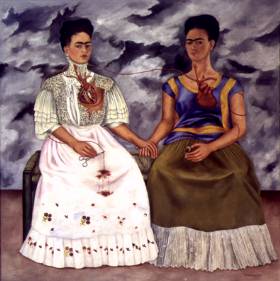
36. I applied to attend and was accepted into the Emily Carr Institute of Art and Design. My parents wanted me to go to a traditional university and so I did. Surprisingly, I took no art studio classes while at Uni. My degree is in English Lit.
37. I was the yearbook editor in high-school. In my final year, I spent most of my free time in the darkroom.
38. I would be happy in an atelier or studio, creating my own beautiful objects without interference from the noisy outside world.
39. Life without beauty is my idea of hell.
40. My last name in Greek means “one who is crowned.”

As I am turning 40 at the end of this month and I’ve been blogging for 10 months (!), I thought it’d be a good idea to share a little bit about me (especially as I’ve been posting so infrequently these past few weeks). So here goes:
1. A natural communicator, I am currently working for the provincial government in public relations.
2. I am happiest when I am left alone to write, paint or draw.
3. While I am by nature gregarious, I do need solitude.
4. I live my life out loud: I laugh loudly and often; I express my feelings and opinions freely; I also cry with abandon. Life is to be experienced in all its glorious messiness.
5. I have been known to cocoon in bed for extended periods of time, shades drawn and covers over my head, especially if I am feeling blue or out of sorts.
6. I have always been a voracious reader. I read anything and everything.
7. While I am a founding member of a book club, I find the “club” aspect annoying. Now that it’s too organized and structured, I’ve lost interest.
8. I am rebellious. Telling me “I have or should do” something makes me disagreeable and cranky. I will, more often than not, do the exact opposite.
9. My father nurtured my independent streak.
10. I love Greek music from the 1950s. Listening to songs from that era sends shivers down my spine.
11. I love my daughter EM more than life itself. She is my greatest joy and blessing.
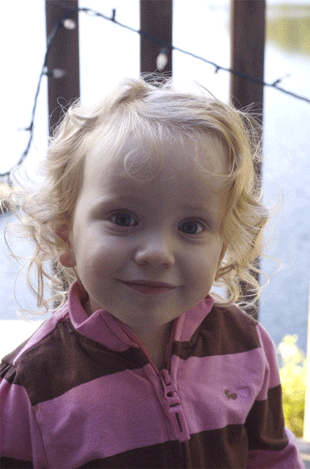
12. I now understand the love my beloved Mama had for me.
13. My husband is my soul mate; he often completes my sentences and knows exactly what I’m thinking.
14. Nothing can compare to falling asleep in his arms.
15. I still think about the drummer and wonder if he ever grew up.
16. I still think about the chronic pot-smoker and wonder if he ever grew up.
17. Growing up my parents filled my head and heart with their stories. Now that they’re both gone I think about all they didn’t share.
18. When I get very upset, I stutter.
19. I’m a hand talker.
20. I am 15 pounds away from my goal weight. I used to be bulimic in my early 20s. I am finally on friendly terms with the bathroom scale.

I stumbled across Ozge’s blog, a daily journal of Ordinary Things in comic form. Struck by their beauty, sense of humour and keen attention to detail, I wanted to share my discovery with you.
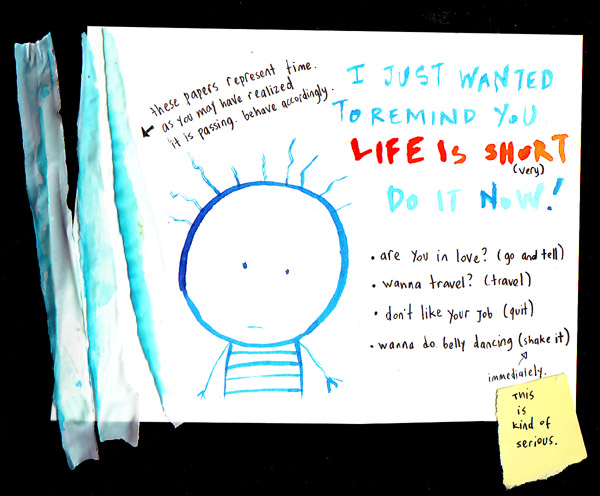

Call for submissions: Greek Artists/Greek Themes
A note from the organizer Jay House ~
Greetings:
I’ve been invited to curate a Greek Cultural Festival at Queens Theater in the Park (QTIP), an indoor theater located in Flushing Meadows Park in Queens, NY, from January 23-27, 2008.
We are interested in work of any genre - from classical drama to modern dance; from a poetry reading to a film screening; from a children’s puppet show to a nightclub singer!
Work should relate to Greece in one or more of the following ways:
• New or old work by a Greek or Greek-American artist/company;
• “Classics” of Greek origin, by artists of any ethnicity;
• New work dealing with Greek themes by artists of any ethnicity,
QTIP features three stages, a 464 seat proscenium stage theater, a 99 seat black-box theater and (in construction now) a 75-100 seat cabaret space with kitchen/bar. There are larger venues available at LaGuardia Community College (750 seats) and at Queens College (2,000 seats). There is also some workshop and exhibition space available for hand-crafts demonstrations and the like. Add-on workshops (dance, crafts, etc) will also be considered.
How to submit:
Email a one-page document that describes the intent of your piece, how it relates to Greek culture, and your technical requirements. Include a budget on a separate document that shows the cost to mount
your production.
Email submissions to [email protected] .
Submissions are due by Friday September 21st.
Please contact me if you have questions, and of course, pass this on to artists who may be interested!
Visit: Aegean Cultural Project for more information.

Found at Plain Simple English.
What do you regard as the lowest depth of misery?
• The loss of my parents: my father to cancer and my mother to dementia.
Where would you like to live?
• Where I live now. I’m old fashioned: home is where the heart is.
What is your idea of earthly happiness?
• To be surrounded by family and close friends.
• To laugh out loud each day and to see beauty everywhere.
To what faults do you feel most indulgent?
• My impulsiveness.
Who are your favorite heroes of fiction?
• The Woman Warrior - the character in Maxine Hong Kingston’s memoir of the same name.
• Penelope (in the Odyssey)
Who are your favorite characters in history?
• Elizabeth I
• Helen of Troy
• St. Mary of Egypt
• Mary Magdalene
Who are your favorite heroines in real life?
• My maternal grandmother and my beloved Mama
Who are your favorite heroines of fiction?
• same answer for favourite characters - tho’ I’ll add that I enjoyed reading Nancy Drew as a child.
Your favorite painter?
• I have three: Freida Kahlo; Gustav Klimt; and, Pablo Picasso.
Your favorite musician?
• I have many; I am currently listening to Ofra Haza and Rose Reiter.
The quality you most admire in a man?
• Intelligence
The quality you most admire in a woman?
• Intelligence
Your favorite virtue?
• It’s a tie between Wisdom and Courage.
Your favorite occupation?
• Writer/Poet
Who would you have liked to be?
• I am still on the journey to becoming me …


Day one of my scheduled break.
What am going to do today?
• catnap
• read
• spend quality time with EM
• write and this includes updating chicken-scratch
• catch up with all my regular online reading
• and, of course, take a deep breath and enjoy the view from here


Leslie is the creative genius behind the Paper Princess: A vintage inspired paperie. Leslie’s designs are hip, quirky, beautiful and functional. My first order will definitely include these customized bookplates:
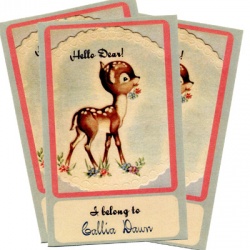

In the last 10 days, people searching (googling) for the following have been led to chicken-scratch. Some connections leave me scratching my head and asking - are we there yet?
1. in memoriam (OK, I do have a number of entries that deal with death, dying and memory)
2. christine needs (To find the time to start writing/blogging regularly)
3. cows of Zurich pictures (Who knew that the cow exhibit I am so fond of has traveled to Zurich too?)
4. chicken races (Do chickens race?)
5. duty free schipol (Ah, yes, our trip to Europe almost 2 years ago now)
6. lessons from mom (I think of my mom everyday and can hardly believe that she’s been gone for 8 months)
7. action speaks louder but pen mightier contradict (I guess someone is learning Latin/Greek maxims?)
8. father gave me an enema (?????)
9. names of the research and their opinions about punctuation marks (I guess people spend their lives dedicated to punctuation usage and its influence on our culture?)
10. gossie stuffed (I’m guessing someone wants to learn how to cook a goose, or are they solely interested in taxidermy?)

I haven’t been posting much lately as my work/life balance is a bit out of whack. My increased responsibilities at work mean longer days and less time to spend with the chicken (who turns 2 today) at home.
It’s the BC Day long weekend and we’re celebrating EM’s birthday with family and friends.
My regular posts will resume … soon. Hope you’re all enjoying the lazy days of summer.

I’ve purchased more books: recent winners of the 3 day novel contest to help prime the writing pump.
I’ve read 2 of the 5 and am amazed at both the quality and diversity in tone, language and subject matter. In a blinding flash of the obvious, I came upon the working title of my novel.
And so I am motivated to begin my morning pages once again.
Book 1: Socket by David Zimmerman 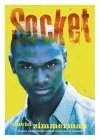
Book 2: Struck by Geoffrey Bromhead 
Book 3: Love Block by Meghan Austin & Shannon Mullally 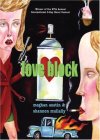
Book 4: Dayshift Werewolf by Jan Underwood 
Book 5: The Convictions of Leonard McKinley by Brendan McLeod 

I’ve entered the 3-day novel contest; this event will take place September 1 - 3, 2007 over the Labour Day Weekend. I am one of a large group of writers worldwide who believes that it’s entirely possible to produce a novel in 72 hours.

What’s my motivation: to get the cobwebs out of my brain, shake things up and get writing again. It could be the summer heat that’s put a brake on my creativity. More likely: my monkey mind.
What’s the outcome: Well, If I win or get short-listed — Grand Prize: Publication (summer 2008); 2nd Prize: $500 cash or 3rd Prize: A great literary prize pack.

1. Use the time of a total stranger in such a way that he or she will not feel the time was wasted.
2. Give the reader at least one character he or she can root for.
3. Every character should want something, even if it is only a glass of water.
4. Every sentence must do one of two things — reveal character or advance the action.
5. Start as close to the end as possible.
6. Be a sadist. Now matter how sweet and innocent your leading characters, make awful things happen to them — in order that the reader may see what they are made of.
7. Write to please just one person. If you open a window and make love to the world, so to speak, your story will get pneumonia.
8. Give your readers as much information as possible as soon as possible. To heck with suspense. Readers should have such complete understanding of what is going on, where and why, that they could finish the story themselves, should cockroaches eat the last few pages.
— Vonnegut, Kurt Vonnegut, Bagombo Snuff Box: Uncollected Short Fiction (New York: G.P. Putnam’s Sons 1999), 9-10.

Doug Savage is the creative genius of Savage Chickens daily cartoons drawn on sticky notes and posted online. I discovered his fabulous chickens late last week while doing research on my Thursday Thirteen post on phobias - and I’m hooked. His chickens have their own theme song and wallpaper - yes, they’re that popular!
Who knew that chickens could inspire such a following?
Or that they could be so astute about office life:
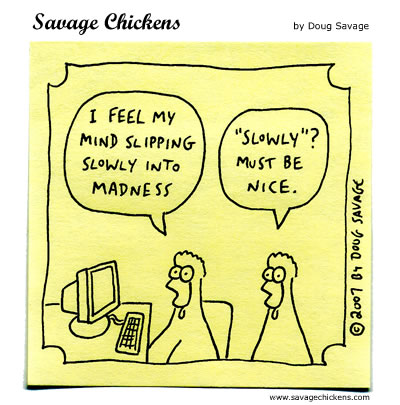

Founded in 2000 by Chris Dunmire, the Creativity Portal is the place to explore and nurture your creative self. The Imagination Prompt Generator is a fun way to break through any writer’s block. Interested in finding other writers, artists and musicians who map their creative journey online? Then look no further than the Creativity Portal’s web directory.
The Creativity Portal is chock full of informative, inventive and entertaining articles. The website is updated frequently, no stale-dated information here. Always wanted to learn to draw a chicken? Chris has a wonderful how-to guide.

A couple of weeks ago, at a local literary event, I spoke about blogging and its love/hate relationship with writing. (Blogging as genre.) In preparation for the evening, the coordinator/emcee asked each member of the panel to comment on what type of punctuation marks we were. We could, if we chose, solicit feedback from friends, family and co-workers.
And so I did.
Below, in no particular order, are some of my favourite responses:
• “You, Christine, are a colon. Unsung but vital, with little patience for waste.”
• “If Christine were a punctuation mark, she would be a trema •• . Often confused with the harsher Germanic umlaut, the trema originates from the Byzantine Greek τρημα, meaning “perforation or orifice.” A little bit foreign, a little bit unusual, and a much classier way to add emphasis and distinction to a word than the common exclamation point. Like Christine, I associate tremas (and umlauts) with the names of fashion designers and expensive restaurants. “
• “An exclamation mark - It’s mostly owing to your fabulous shoes and bags which scream out wonderful things about your personality that are otherwise hidden by your serious, grown-up job.”
• “An exclamation mark! Full of punch, zing, and enthusiasm!”
• “There’s nothing about you that indicates pause, or final moments. You’re about living life and loving it! You are an exclamation mark!”
• “An exclamation mark! You are optimistic, glass half-full versus half-empty. You create fun and lightness.”
• “A semi-colon. Rare, seldom used, mysterious and of a higher order.”
• “A semi-colon because you’re always making connections of independent clauses that are so meant to be together.”
• “An ellipsis … creating space and never coming to a full stop.”
• “An ellipsis … because there’s always more.”
And, what type of mark did I choose?
The semi-colon as it’s is a wee bit sexy and equally controversial. If I could be used by Shakespeare and maligned by Kurt Vonnegut, like my friend the semi-colon, I would consider myself fulfilled.
What about you? What type of punctuation mark would you be and why?

The wonderfully talented and generous Thomma-Lyn honored me with a Thinking Blogger Award.
How does one define a thinking blogger? Well, according to an article posted on The Blog Herald:
These are the bloggers who will keep me thinking about their words long after I’ve finished reading them. Their passion boils up through their writing to flow out of the computer and into my heart and mind. Two, three, or four hours, maybe a day or two, or even months later, their words will bubble up out of my unconscious like an old song I can’t get out of my head.
Their words invoke images, vivid thoughts, and possible changes of mind. Their words are food to my hungry spirit. I want more.
Their blog represents a body of work which creates a sense of trust and respect for their opinion and advice. I know they honestly know what they are talking about.
These are the bloggers who don’t need to brag, show off, or honk their horns. They don’t need parlor tricks on their blogs. They don’t need to. These are humble folks who blog about their passion and it shines through. It can’t help it. You know it, you feel it, you experience it effervescing from among the sentences on the page.
You know this person is living, and writing, their passion.
Do I think I qualify? Ah, no. But there is one sentence that I do strongly identify with: living, and writing, their passion.
In the short time that I’ve been writing online, I’ve discovered an entire community of authors and artists who have welcomed me into their world. The exchange of ideas, the banter and the commitment to their craft amazes me.
That’s why, for example, I “tagged” Thomma-Lyn last week. Her writing makes me want to be a better writer. Her sense of humour and compassion makes me want to be her friend. Thank you.
Here are the rules for the Thinking Blogger award:
1. If, and only if, you get tagged, write a post with links to 5 blogs that make you think.
2. Link to this post so that people can easily find the exact origin of the meme.
3. Optional: Proudly display the ‘Thinking Blogger Award’ with a link to the post that you wrote.
So, who am I going to tag with this award? Who lives and writes their passion?

1. Rana at Frogs and Ravens
2. Bud at Chekhov’s Mistress
3. Cooper at Wonderland Or Not
4. Shirl at New Age
5. Rhian at From My Brain to Yours
So, what are you waiting for? Go check out these talented, amazing people!

According to the manufacturer Palmers Slim Fit 20 Tights

will improve skin elasticity, burn fat and reduce the appearance of cellulite on your thighs. The Austrian company tells us that in order to achieve these miraculous results, the tights need to be worn daily for 28 days. And, the tights “embedded with caffeine micro capsules” can be washed up to five times before they lose their effectiveness.
Don’t know about you, but I’d rather get my caffeine fix the old fashioned way, by drinking it!
For more info, go to Tights Please.

Music videos like this one make me nostalgic for Japan:
Continue reading "Tip toe through the Chu Lips . . ." »

It’s official - I am one of eight writers participating in the Victoria School of Writing’s ~
SHIFT: LITERARY EXPLORATIONS
What do you get when you cross a pride of writers with an art gallery, some cupcakes and a bunch of typewriters? You’re invited to find out by attending VSW’s exciting new public program, Shift: Literary Explorations.
We’d love to see you there.
Here are the details:
Saturday, May 5 | 7-10pm
Open Space | 510 Fort St.
Fun & Games: Prize wall, insta-lit for a toonie, cheap libations, free cupcakes & pretzels, luminous special guests and general shenanigans!
Where are we?
Eight writers give their take on the current state of their genre, including:
• Meg Braem (playwrighting)
• M.A.C. Farrant (literary non-fiction)
• Bill Gaston (fiction)
• David Leach (literary journalism)
• Sylvia Olsen (young adult fiction)
• Steven Price (poetry)
• Erin Robinsong (spoken word)
• Christine Stefanitsis (blogging)
Convergence: Discussion and Q&A
Tickets: $12 at the door or $10 in advance
Buy them at The Papery, 669 Fort St. Advance tickets recommended.
For more info visit the Victoria School of Writing Blog , or print out your own groovy pink poster (pdf) here.

Poet(s): bill bissett, Isa Milman, Naomi Beth Wakan, Andrea Mackenzie, Margo Button
Name of Reading Series: Planet Earth Poetry
Date: April 6, 13, 20, 27, 2007
Time: 7:30 p.m.
Venue: Planet Earth Poetry at Black Stilt
1633 Hillside
Victoria, B.C.
(250) 370-2077
Cover: $3
Event Details: A special weekly National Poetry Month series featuring poets on each Friday evening throughout the month of April. For more info: http://planetearthpoetryatblackstilt.blogspot.com/
Poet(s): Wendy Morton, Barbara Pelman, Yvonne Blomer, Isa Milman, Carla Funk
Name of Reading Series: “Future (In) Tense”
Date: Thursday, April 12, 2007
Time: 7:30 p.m.
Venue: Victoria City Hall
1 Centennial Square
Victoria, BC
250-361-0571
Event Details: The poets will read works that relate to what the individual poets envision for the future of the Victoria region.
Poet(s): Susan Stenson, Isa Milman, Pamela Porter, Wendy Morton Yvonne Blomer
Name of Reading Series: Poetica Erotica
Date: Saturday, April 21, 2007
Time: 7:30 p.m.
Venue: Bean Around the World Coffee House 533 Fisgard Street Victoria, B.C.
250-381-3422
Cover: $7
Event Details: Three years ago, Wendy Morton organized a night of poetry for National Poetry Month called “Poetica Erotica”, and invited twenty or so poets from this very rich region of poets to compose a new erotic poem. It was well attended and full of water and chocolate and juicy poems. This event will feature poets reading on a similar topic.
Poet(s): Mostly Poets: Marieluisa Auterson, Louie Adell, Elizabeth Bartel, Sharon Tilton Urdahl
Date: Wednesday, April 26, 2007
Time: 2 p.m.
Venue: Courtenay Regional Library
300 - 6th Street
Courtenay, B.C
334-3369 ext. #3
Event Details: Poets and poetry lovers are invited to celebrate National Poetry Month as the Mostly Poets read personal poetry and host an open mic for others interested in reading their original work. A time limit will be in effect for open mic readers to allow everyone ample time to share their words. Mostly Poets hope that the “open mic” poets will bring a sampling of what they feel “poetry of the future” may sound like.
Poet(s): Mostly Poets: Marieluisa Auterson, Louie Adell, Elizabeth Bartel, Sharon Tilton Urdahl, Jan Bush, Vera Jensen, Katherine Kane, Judith Heron
Date: Saturday, April 28, 2007
Time: 7 p.m.
Venue: Campbell River Community Arts Council
2131 South Island Highway Campbell River, BC
(250)-923-0213
Event Details: This is the third and last event of National Poetry Month for the Mostly Poets group. They will be a reading at the Campbell River Arts Council, helping to celebrate the Campbell River Arts and Cultural Week. They will be hosting an open mic followed with a question and answer time.

TASTE- Victoria Tea Festival
March 11, 2007
Victoria, BC
Meet with tea purveyors, enjoy tea tastings and food pairings, and take in some tea education and lore. Tickets required.
DRINK- Victoria Festival of Wine
March 14 & 15, 2007
Victoria, BC
The tag-line says it all- music, wine, and food. Tickets required.
FESTIVAL- Pacific Rim Whale Festival
March 17-25, 2007
Vancouver Island, BC
Hosted by Tofino and Ucluelet, this festival celebrates the annual whale migration. Gastronomic activities include a gala dinner, a chowder chow down, and a barnacle bash. Tickets required.
TASTE- Chocolate Fest 2007
March 25, 2007
Victoria, BC
Chocolate-y games, demos, workshops, exhibits, and tastings to raise funds for Big Brothers Big Sisters of Victoria. Tickets required.
FUNDRAISER- Dining Out for Life: Vancouver Island
March 29, 2007
Vancouver Island, BC
Dine at participating restaurants on Vancouver Island, and 25% of proceeds will go towards AIDS Vancouver Island.
|



















